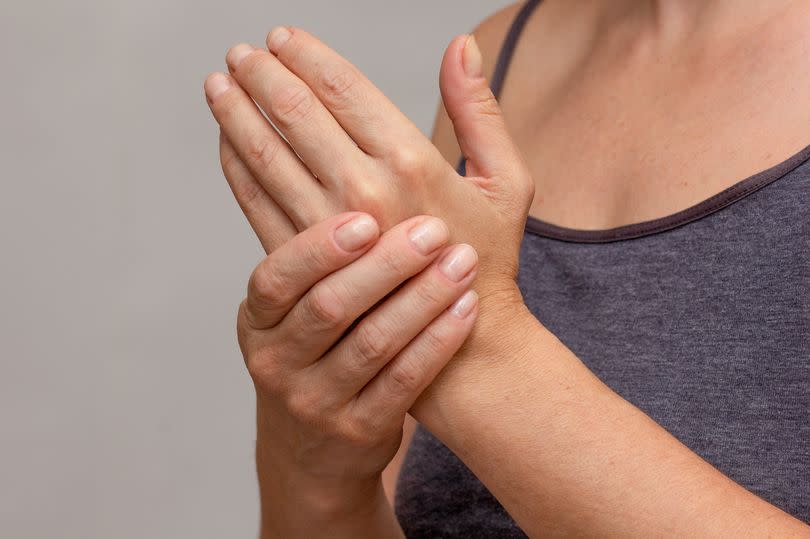Symptoms of gout as cases of 'terrifyingly painful Victorian illness' on the rise

Dubbed the 'disease of kings', cases of gout are on the rise in the UK. Historically, gout was associated with opulent lifestyles and typically afflicted the wealthy.
However, that is now changing. A combination of poor diet, increasing obesity, and a lack of exercise means that gout cases are on the rise not just in the UK, but across the world.
It is is caused by having too much uric acid in your blood. This can lead to crystals forming around your joints, which causes pain. It sometimes runs in families, and is more common in men, especially as they get older.
But what is gout, what are its symptoms, and how can it be treated?
What is gout?
According to the NHS website, gout is a type of arthritis that causes sudden, severe joint pain. Painkillers can help the pain and healthier lifestyle choices can prevent future attacks. It is characterized by sudden, severe attacks of pain, swelling, redness and tenderness in one or more joints, most often in the big toe.
"You talk about it as a Victorian illness and that is the association we have - there are sort of famous Victorian cartoons of gout as a demon biting someone's toe cause it's so terribly painful," said Dr Xand van Tulleken.
"It's a famous disease in Victorians because Queen Victoria had it, and in history, really only famous people, rich people, very prominent people who could afford to eat the kind of foods that would give them gout had it. But in fact, gout was extremely uncommon until fairly recently."
Some parts of the country have seen incredible increases in cases, such as a 121 per cent surge in South Warwickshire from 2019 to 2023. In Dorset, the rise is an astonishing 219 per cent, while Liverpool has seen a jaw-dropping 960 per cent increase.
What are the symptoms?
The main symptoms of gout are sudden severe pain in a joint – usually your big toe, but it can be in other joints in your feet, ankles, hands, wrists, elbows or knees. Also, you can get hot, swollen, red skin over the affected joint – redness may be harder to see on black or brown skin.
An attack of gout can occur suddenly, often waking you up in the middle of the night with the sensation that your big toe is on fire. The affected joint is hot, swollen and so tender that even the weight of the bedsheet on it may seem intolerable. The pain is likely to be most severe within the first four to 12 hours after it begins.
After the most severe pain subsides, some joint discomfort may last from a few days to a few weeks. Later attacks are likely to last longer and affect more joints. An attack of gout usually lasts 1 to 2 weeks if left untreated. If you do not get treatment, future attacks may last even longer. Leaving gout untreated may cause lasting damage to joints.
Is it treatable?
Gout symptoms may come and go, but there are ways to manage symptoms and prevent flare-ups. If you have symptoms of gout for the first time, or have gout and your usual treatments are not helping, then you are advised to see your GP.
If you have a sudden pain and swelling in a joint and the pain is getting worse, you also have a very high temperature (you feel hot and shivery), or you also feel sick or cannot eat then you should ask for an urgent GP appointment or get help from NHS 111. These symptoms could mean you have an infection inside your joint and need urgent medical help.
Attacks of gout are usually treated with a non-steroidal anti-inflammatory (NSAID), like ibuprofen. If the pain and swelling does not improve you may be given steroids as tablets or an injection. Gout can come back every few months or it may be years. It can come back more often if it's not treated. If you have frequent attacks or high levels of uric acid in your blood, you may need to take uric acid-lowering medicine. It's important to take uric acid-lowering medicine regularly, even when you no longer have symptoms.
If you’re having a gout attack, there are things you can do to relieve the pain:
take any medicine you've been prescribed as soon as possible – it should start to work within 2 days
rest and raise the limb
keep the joint cool – apply an ice pack, or a bag of frozen peas, wrapped in a towel for up to 20 minutes at a time
drink lots of water (unless a GP tells you not to)
try to keep bedclothes off the affected joint at night
Do not put pressure on the joint – this can make the pain feel worse.
How to prevent gout
You might have a higher chance of getting gout if you are overweight, drink alcohol, have been through the menopause take medicines such as diuretics (water tablets), or medicines for high blood pressure (such as ACE inhibitors), have high cholesterol, or have high blood pressure, kidney problems, osteoarthritis or diabetes have had surgery or an injury.
You might get a gout attack if you have an illness that causes a high temperature, drink too much alcohol or eat a very large, fatty meal, get dehydrated, injure a joint, or take certain medicines.
Making healthy lifestyle choices may mean you can stop or reduce further gout attacks. This includes losing weight, eating a healthy, balanced diet, have some alcohol-free days each week, drink plenty of fluids to avoid getting dehydrated, exercise regularly - but avoid intense exercise or putting lots of pressure on joints - quit smoking, and ask a GP about vitamin C supplements. Avoid sugary drinks or snacks and fatty foods.

 Yahoo News
Yahoo News 
